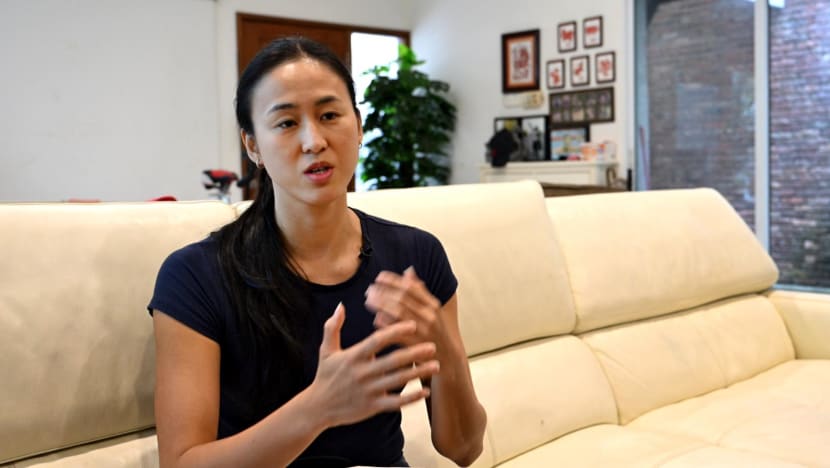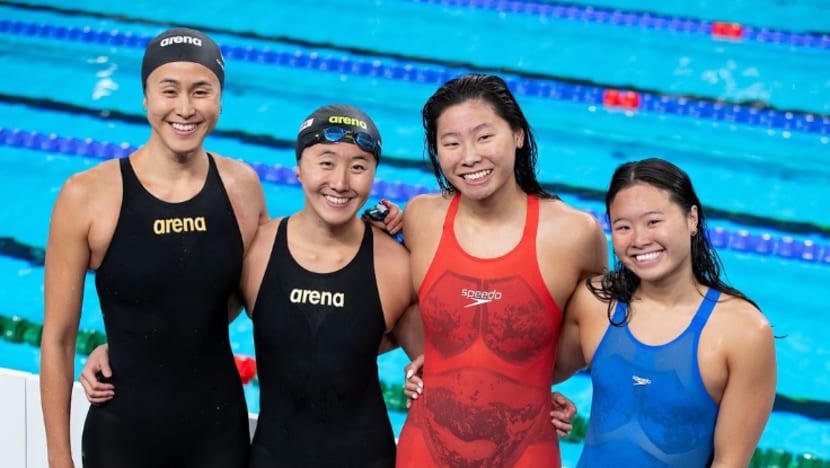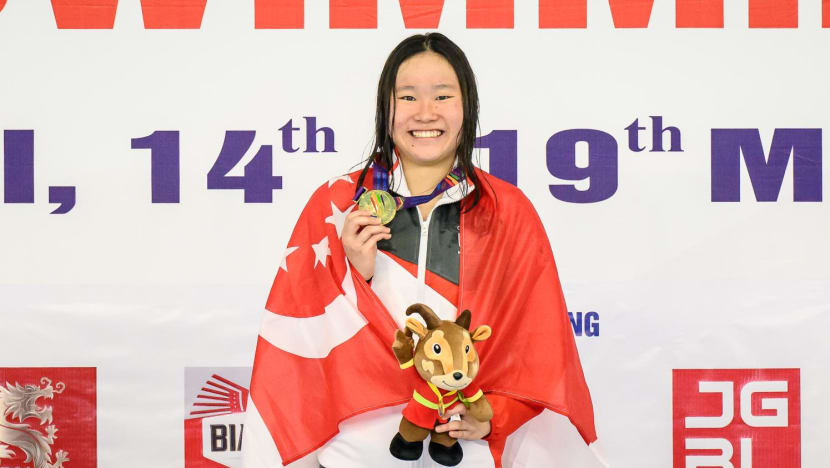‘Hardest setback in my career’: Quah Ting Wen on her shock omission from Olympic team
“The athlete in me will not be okay with me ending my career like this,” the national swimmer opens up to CNA in a one-on-one interview.

In a one-on-one interview with CNA on Jul 9, 2024, Singapore national swimmer Quah Ting Wen reflects on her omission from the Paris Olympics. (Photo: CNA/Jeremy Long)

This audio is generated by an AI tool.
SINGAPORE: National swimmer Quah Ting Wen has faced several hiccups in her 20-year career, but none stung as hard as her recent exclusion from the Olympic Games.
“I would say that this is the hardest setback in my career,” said Quah in a sit-down interview with CNA in her home.
“I thought last year in Hangzhou during the Asian Games - that would be one of my lowest points in my career … I didn't know that in less than a year, I’d be able to top that.”
In October, swimming the anchor leg in the women’s 4x100m medley relay, Quah took off from the blocks a fraction of a second early, resulting in the team's disqualification and the loss of what would have been an Asian Games bronze medal.
The 31-year-old said that she was hoping to bounce back from that dark period last year with a strong 2024 that would culminate in her participation at the Paris Games.
But her hopes came crashing down when she was omitted from a 22-athlete list at the Team Singapore flag presentation ceremony on Saturday, despite being part of the women’s 4x100m medley relay team that had met the Olympic qualifying criteria in February.

The decision was made final on Monday (Jul 8) night when two separate appeals for her to be on the team were rejected.
“This year was going pretty well and I was very excited. So yeah, this is pretty hard for me, especially coming out of last year with China,” she said.
SELECTION PROCESS CAN BE IMPROVED
Quah signed a document last Thursday, accepting Singapore Aquatics’ (SAQ) invitation to represent Singapore at the Paris Games.
But in a turn of events, SAQ decided to send Gan Ching Hwee instead, who will swim in the 4x100m medley relay, in addition to the individual 800m and 1,500m freestyle events.
The confusion, Quah said, stemmed from how World Aquatics - the global governing body - allotted its Olympic slots. It had first confirmed the athletes participating in the relays, such as Quah, before filling up the spots for swimmers who met the "B" qualifying times, which included Gan.
Quah said that SAQ should have considered the possibility that another athlete could have qualified before asking her to sign what she saw as a binding agreement.
She argued that World Aquatics's selection process had been in place for a long time, so the possibility of Gan being offered an Olympic berth was not unthinkable.
“It should have been (SAQ’s) responsibility to cover all our bases … then it will make it easier for the governing body (SAQ) to understand how to handle every situation as it comes,” she said.
“I think that there needs to be accountability taken there, (to) take a look again at the selection policy and try and make it better moving forward.”
However, she conceded that it was not easy for SAQ, who had to confirm with World Aquatics a relay team that would be going to Paris before World Aquatics could move on to give out "B" qualifier slots.
“I think there was no way for them not to confirm my name because it had to be put in a long time ago,” said Quah.
However, she agreed that the confirmation need not have been a binding one, and the document could have been worded in a way to indicate that her participation was conditional.
“There should also be transparency and communication between the athletes and the management, so that we also know better what's happening, and not be told at the last minute,” she said.
Quah expressed concern that this episode would erode the trust of future national swimmers.
“For them to be confident in the system, to know that they can qualify for something by merit, that they can put their names down, sign something, and be assured that they have the spot that they earn on the team.”
NOTHING AGAINST GAN
Quah also sought to debunk any assertion that the episode stemmed from a rivalry between herself and Gan.
Coincidentally, in 2021, the two athletes were embroiled in a similar selection dispute. A Singapore Swimming Association (as SAQ was then known) committee initially picked Gan for the Tokyo Olympics, but it was Quah who went to Japan instead after an appeal.
“It is just extremely unfortunate that it is the exact same two people put in a very, very similar spot three years ago,” said Quah.
This year, World Aquatics offered Gan an invitation to participate in the women’s 1,500m event based on her Olympic Consideration Time – or Olympic “B” cut – of 16:10.61.
Swimmers automatically qualify for the Games if they meet the Olympic qualifying time, or “A” cut, and may be invited to compete if they meet the “B” cut.
World Aquatics then offered Singapore the choice of sending Gan or three relay-only swimmers. Following its selection criteria, SAQ chose Gan, which led to Quah's exclusion from the team.
Any swimmer could have been thrust into this difficult situation, said Quah.
“It is nothing against any individual; it is all about a selection policy and how you don't want to hurt your athletes,” she said.
“I don't think this takes away from any of the hard work that Ching Hwee has put in and it doesn't take away from how well she’s swum.”
She added that the situation was also unfair to Gan, who now has to swim the 100m freestyle leg in the relay.
“It can't be easy, right, to ask a long-distance swimmer who has been training for her own event to suddenly have to step up and swim in an event that she hasn't trained for, like hasn't been on before with these other girls,” said Quah.

HITTING BACK AT THE NAYSAYERS
Quah also hit back at online comments criticising her for fighting for the Olympic spot at the expense of the younger, less-experienced Gan, who is over 10 years Quah’s junior.
Quah said that, ultimately, it is not age or youth but merit by which swimmers should be chosen to represent Singapore on the biggest stage.
“I'm all for encouraging the younger ones to step up and be competitive and to push the boundaries, but this is a competitive sport,” she said.
“If you want a spot on the team, you qualify by merit, and I think that is the thing that would push younger athletes to be better.”
She added that it was immaterial that Paris would have been her fourth Olympic Games and that her hunger to compete remained.
“People would be very quick to comment: You've gone before, why go again? For me, if I thought that way, I wouldn't be in the sport anymore,” she said. “It would still have been very, very important to me to go and to represent at the highest level.”
Related:
WHAT’S NEXT?
Describing the entire episode as shocking, disappointing and frustrating, Quah nevertheless wants to leave behind the most difficult period of her career.
“You never know what’s going to happen, what life is going to throw at you. You always hope for the best, but sometimes the things that come hit you a lot harder,” she said. “I think I will need some time to process everything and come out of it hopefully better.”
She added that support from those around her, especially from her siblings and national teammates Jing Wen and Zheng Wen, has also been invaluable.
“The little bit of good I think that I've been able to get out of it is that I see how much I am loved and supported by the people around me,” she said.
She also appreciates SAQ’s plans to involve her in next year’s World Aquatics Championships held in Singapore, as well as the SEA Games, but has not formed concrete goals as she is “still processing everything”.
So, Los Angeles 2028? Quah, who will be 36 that year, is not ruling that out.
“Paris was supposed to be my swansong in a way, so let's see.”
Quah made her national debut at the 2005 SEA Games and is determined not to wrap things up on this bitter note.
“I think if I look back in five years at how I finished my career right now and just ended it here, I would feel deeply unsatisfied with that,” said Quah.
“I know that the athlete in me … will not be okay with me ending my career like this."











.jpg?itok=z1ZztFWh)





